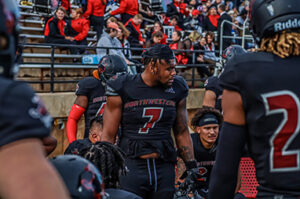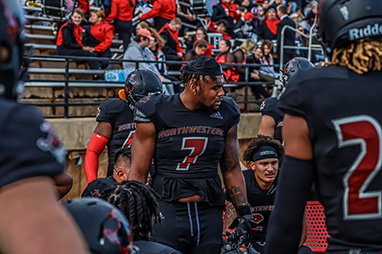By J.D. Eddy, Editorial Editor
Leadership on a collegiate team is as important for the team’s morale as the decisions the coaching staff makes.
When I played football, there were many players who led by example. Sometimes, they were vocal about their concerns, whether it be during workouts, practices, team events and things that happened off campus.
When the leaders who lead by action call you out, you’re in trouble.

When I played football in the spring of 2021, we had a workout at 6 a.m. I was sluggish, not finishing through the line during conditioning. We had to keep restarting.
After two of these restarts, Diquan Bradford, also known as “Thump,” called me out on it. This is not to say it was a bad thing; when he called me out, it showed the leadership. He told me to take responsibility and finish through the line.
Thump was more of a quiet person normally, never really talking during workouts. He consistently outworked people. This is something most collegiate teams nee; vocal leadership is good most of the time. Thump was never one to talk a lot during workouts, when he needed to he made his voice heard.
I wanted to pull experiences from other teams on campus on leadership.
Gavin Mendoza, a junior catcher on the baseball team, had this to say about teammate Thomas Beiswanger, a senior second baseman: “Last year, he struggled with injury problems in the fall and in the spring. But despite that, he was leading by example, showing that being a good role model on and off the field has an impact on a team. He was working his tail end off despite the injury. Even with a broken bone in his hand, he stayed positive … . Thomas put in the work, whether it be in the cages or on the field, for hours at a time. For me being a younger guy, he showed me the dedication that it takes to come back from an injury and be productive on the field.”
If you want to be productive and efficient, this is what you need: someone to show you that, no matter the hardships you endure, hard work is what can bring you through these obstacles.

Now let’s discuss the seniors on the team. These are people that have been with this team for all four years of their collegiate careers or who transferred in from junior colleges. They matter the most for the leadership role not just because they are older. They’ve put in the time and know what needs to be done to win games. If they are starters, they are held to an even higher standard.
This standard means they consistently work hard, hit their weight goals, beat everyone in sprints, out-hit everyone or just keep being the best people on the field effort-wise. I say “effort-wise” because there are seniors who have never played, maybe because they are not as talented. But the effort is there. These players want to be on the field and try hard every single day. It may not ever happen, but they’ve shown that hard work pushes you forward even if you don’t play.
None of this is to say that most teams don’t have leadership – they do. The point is to tell you the importance of having leadership on a team. It all relates to their actions on and off the field of play.
Their example is what inspires younger players, showing them the standard that is set forth by the program. This all starts at the coaching level as well, if your coaches can’t inspire leadership. Then it is up to the players.

